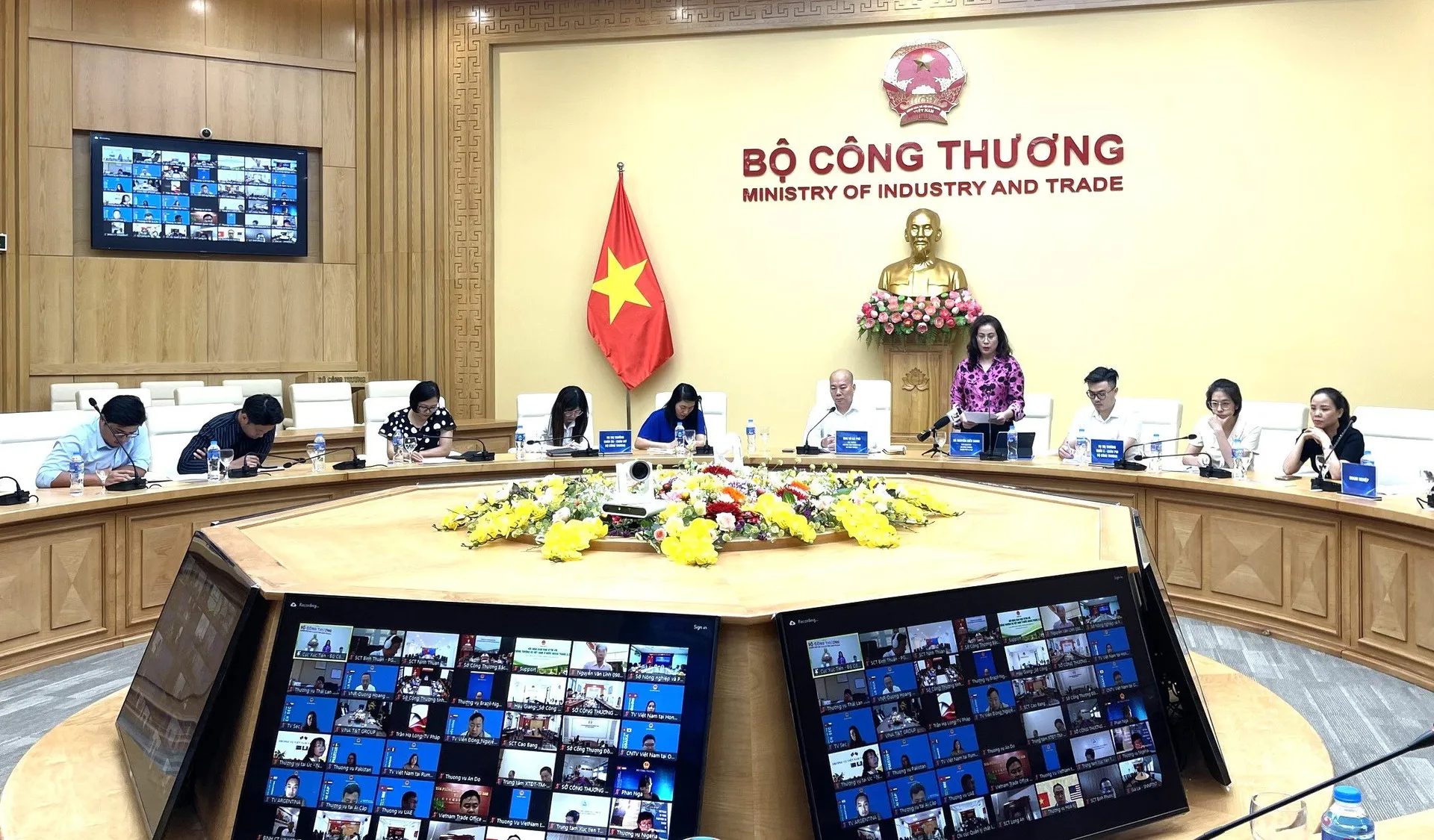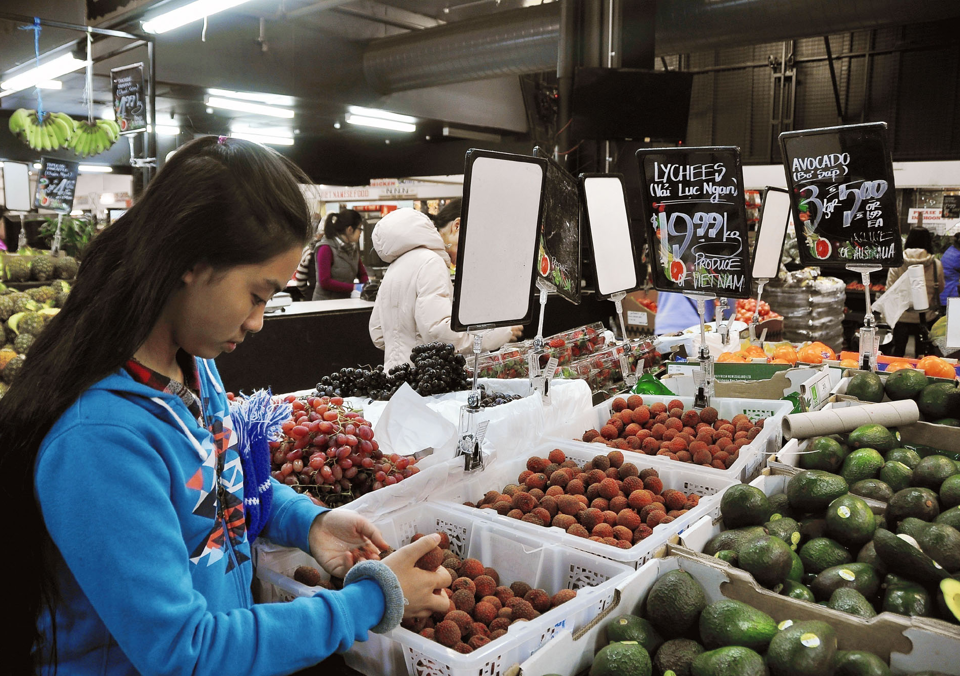Farm produce among Hanoi’s top exports in first 5 months
More and more products labeled 'Made in Vietnam' are appearing in international supermarket chains and retail systems in major global markets.
In the first five months of 2024, agricultural products continued to be among the fastest-growing product categories within Hanoi's top 11 export groups from Hanoi. Among these, rice exports increased by approximately 107.5% compared to the same period last year.
| Overview of the meeting. Photo: Luu Hiep |
Deputy Director of the Hanoi Department of Industry and Trade Nguyen Kieu Anh shared this information at a trade promotion conference with Vietnam's overseas trade offices held on May 31, which focused on "Promoting Seasonal Agricultural Exports."
Oanh noted that in the first five months of the year, Hanoi's exports experienced positive growth, reaching $7.1 billion, a 7.7% increase compared to the same period last year.
Of the 11 main export categories, seven showed growth compared to the same period last year. These categories included agricultural products, computers, electronics and components, ceramics, machinery, equipment and spare parts, wood and wood products, and others.
Currently, the city has over 13,000 agricultural and forestry production and business establishments, with 16 certified fruit-growing areas.
Out of Hanoi's 1,649 OCOP products, 20 have earned 5-star export ratings, and 1,089 have achieved 4-star ratings. Some high-quality agricultural products exported from Hanoi include late-season Dai Thanh longan to the US, Dong Phu organic rice to Germany, Van Duc vegetables to South Korea, and pink bananas to China.
In the first five months of 2024, agricultural products continued to be the fastest-growing export group among Hanoi's primary export categories. Within Hanoi's total agricultural export value, rice accounted for 50%, coffee for 14%, cashew nuts for 11.5%, pepper for 6.8%, and tea for 4.6%.
To boost agricultural exports, the city is intensifying the development of production centers and raw material supply areas for production and export. It is also promoting the establishment of industrial zones and clusters to attract FDI and domestic enterprises to produce key export products.
Regular meetings with businesses are held to address challenges and enhance production and exports, Oanh said.
Additionally, the city is improving the effectiveness of trade promotion and investment programs adapted to the new context. It is also effectively implementing initiatives to engage overseas Vietnamese in promoting and consuming Vietnamese products and developing distribution channels for Vietnamese goods.
| Vietnam's lychees in Australian supermarket. Photo: Hoai Nam/The Hanoi Times |
Promoting Vietnamese products abroad
Speaking at the conference, Vu Ba Phu, Director of the Vietnam Trade Promotion Agency, highlighted that Vietnam's economy, with its strong agricultural sector, relies heavily on agricultural production.
“Agricultural products are crucial for domestic food supply and livelihoods, and they also play a strategic role in exports, contributing to trade balance improvement and economic growth,” said Phu.
In recent years, with deeper economic integration, Vietnam's agricultural exports have expanded, focusing on diversification and sustainable export growth. This includes reducing the proportion of unprocessed goods, increasing deep processing, and enhancing product value and quality.
"More and more products labeled 'Made in Vietnam' are appearing in international supermarket chains and retail systems in major global markets. The quality of these products, competitive prices, improved production processes, product variety, and compliance with safety standards have helped Vietnamese agricultural products win the trust of consumers in demanding markets like Europe, the US, Japan, and many other countries. This has positioned Vietnam as a key player in the global agricultural supply chain, despite global economic challenges," emphasized Phu.
From the beginning of the year, exports have continued to be a bright spot in the economic picture, maintaining impressive growth. According to the General Statistics Office, export turnover in May reached $32.81 billion, up 15.8% year-on-year. Notably, the fruit and vegetable sector saw impressive growth, with May’s export turnover estimated at $700 million, up 7.4% from the previous year. Overall, the trade balance for the first five months of 2024 is estimated to have shown a surplus of $8.01 billion.
While the export market potential is vast for Vietnamese enterprises, Phu noted that competition in the agricultural sector is becoming increasingly fierce.
For Vietnamese agricultural products to stand out on international shelves, exporters and producers must continuously improve product quality and meet quality standards, testing, packaging, and traceability requirements of importing countries, he noted.
Do Ngoc Hung, Head of the Vietnam Trade Office in the US, agreed, pointing out that Vietnam’s export goods face challenges such as short harvest seasons and the perishable nature of fresh produce; long distances increase transportation time and costs; competition from South America and Asia with similar products, along with limited preservation technology, result in reduced quality and freshness upon arrival; domestic production remains small-scale, making it difficult to meet importers’ volume and requirements. Additionally, there has been insufficient investment in packaging, labeling, and marketing in the US market.
"Localities and enterprises should enhance the added value of seasonal fruits by introducing processed products such as dried fruits, fruit powder, and canned goods for year-round consumption. The use of new technologies to prolong fruit preservation, such as dormancy, living cell preservation, biological preparations, and approved preservatives, can ensure a longer shelf life.
“A comprehensive plan should be developed for systematic promotion, highlighting the story and image of the growing regions, and organizing product showcases at Vietnamese and Asian markets," recommended Hung.














